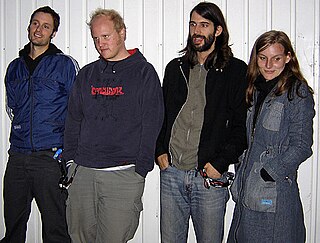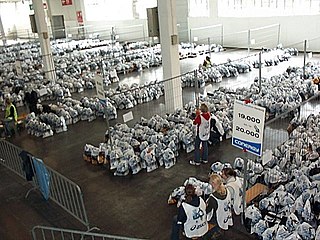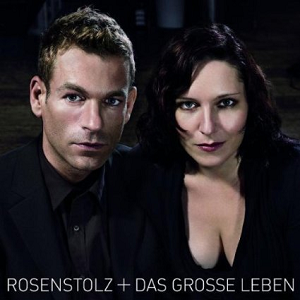Related Research Articles

Friedrich Wilhelm Ernst Busch was a German singer and actor.

Gerhart Eisler was a German politician, editor and journalist. Along with his sister Ruth Fischer, he was a very early member of the Austrian German Communist Party (KPDÖ) and then a prominent member of the Communist Party of Germany during the Weimar Republic.

Wir sind Helden was a German pop rock band that was established in 2000 in Hamburg and based in Berlin. The band was composed of lead singer and guitarist Judith Holofernes, drummer Pola Roy, bassist Mark Tavassol and keyboardist/guitarist Jean-Michel Tourette.

Judith Holfelder-Roy, known by her stage name Judith Holofernes, is a German singer, guitarist, songwriter and author.
Hans-Friedrich Blunck was a German jurist and a writer. In the time of the Third Reich, he occupied various positions in Nazi cultural institutions.

The Hamburg Marathon is an annual marathon race over the classic distance of 42.195 km (26.219 mi) held in Hamburg, Germany. In 2009, 13,938 participants were counted. The marathon is categorized as a Gold Label Road Race by World Athletics.
Kirsten Heisig was a German juvenile magistrate. Heisig was criticized by parts of the political left and parts of the Arabic community for her statements and for her view that some foreign cultures neglect education and encourage juvenile delinquency. As a juvenile magistrate for Neukölln, an area with a crime rate 40% above the average of Berlin, she initiated the Neukölln model that streamlined procedures and targeted an appearance before court within 3–5 weeks after the deed had been committed for deeds punishable by a maximum imprisonment of 4 weeks. Other key elements were encounters between delinquent and victim and community service and a cooperation between legal organs and social workers. This model was extended to the entire city of Berlin in June 2010 and caught attention on a national level.

Ferdinand Friedrich Hermann Nielebock, known as Herms Niel, was a German composer of military songs and marches.

Frei.Wild is a German rock band from Brixen, South Tyrol, Italy. Its members belong to the German-speaking population of South Tyrol and their songs are mostly in German.

"Holy God, We Praise Thy Name" is a Christian hymn, a paraphrase of the Te Deum.

Das große Leben is the tenth studio album by German pop duo Rosenstolz, released in 2006 by Island Records. Consisting mostly of ballads, the album topped the German and Austrian albums charts and became Rosenstolz's biggest selling album, with over one million copies sold. Five singles from the album were top 20 hits in Germany.
Franz Schubert's best-known music for the theatre is his incidental music for Rosamunde. Less successful were his many opera and Singspiel projects. On the other hand, some of his most popular Lieder, like "Gretchen am Spinnrade," were based on texts written for the theatre.
The San Diego Breakers were an American professional rugby union team based in San Diego, California, that competed in PRO Rugby. The team played its home games at Torero Stadium.

"Ach lieben Christen seid getrost" is a Lutheran hymn in German with lyrics by Johannes Gigas, written in 1561. A penitential hymn, it was the basis for Bach's chorale cantata Ach, lieben Christen, seid getrost, BWV 114.

"Freiheit", also known as "Spaniens Himmel" or "Die Thälmann-Kolonne", is a song written in 1936 by Gudrun Kabisch and Paul Dessau, German anti-fascists. The song was written for the International Brigades but later became a popular standard in Germany and in American communist and folk music communities. The title translates as "Freedom" in English.
"Wir schaffen das" is a statement made by Angela Merkel, the then-Chancellor of Germany, during the 2015 European migrant crisis. It has been described as a core slogan of the German concept of Willkommenskultur. She repeated the statement several times at the 2015 Christian Democratic Union party conference. The phrase has become a symbol of Merkel's refugee policy used by supporters and detractors alike.

Jakob Blasel is a German climate activist and politician of Alliance 90/The Greens.
A Narrenmarsch is a composition of march music that is exclusively played at Fastnacht. Especially in the traditional Swabian-Alemannic Fastnacht, nearly every town has its own Narrenmarsch. The marches are mostly played during parades and other public events of the Narren. Many of these marches also got lyrics written for them that participants and audience can sing along.
Kurt Rommel was a German Protestant pastor of the Evangelische Landeskirche in Württemberg, author of spiritual books, and hymnodist. He wrote text and tune of hymns contained in both Protestant and Catholic hymnals.

The Deutsche Synchronkartei is an online database of voice actors in film and television productions. It is listed as a scientific and freely accessible source of information in the Datenbank-Infosystem.
References
- ↑ Engel, Eduard (1906). "bd. Von Geothe bis in die Gegenwart" (in German). G. Freytag. p. 1069. Archived from the original on 17 February 2018. Retrieved 21 December 2017.